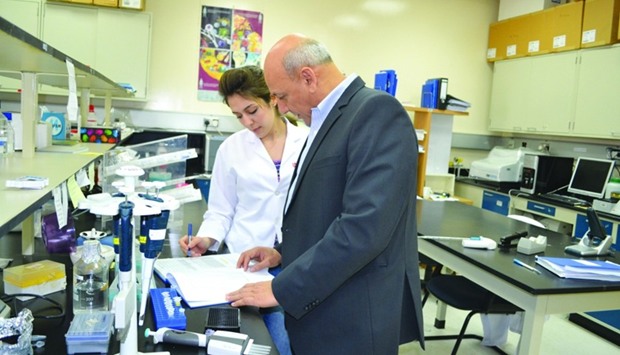Research carried out by Dr El-Agnaf’s team of scientists that uses novel techniques to identify biomarkers of Parkinson’s disease in human blood and cerebral spinal fluid samples attracted the attention of AFFiRiS AG, a leading name in the field of developing immunotherapies that target chronic diseases with unmet medical needs.
AFFiRiS AG called upon the Qatar-based team to use the tools and expertise developed at HBKU to validate the target engagement of alpha-synuclein for the company’s first-of-its-kind Parkinson’s disease immunotherapy approach. The product has been developed in Europe by a team of scientists and its pre-clinical and clinical development has been supported by Michael J Fox Foundation.
Using the team’s novel analysis techniques, the researchers at HBKU will assess the product’s ability to engage with the target, alpha-synuclein. QBRI’s scientists will explore novel biomarkers discovered by them that facilitate early diagnosis and treatment of Parkinson’s disease and use the technique they have developed at HBKU to assess the magnitude of target engagement of this new immunotherapy-based compound.
Dr. El Agnaf’s group, based within QBRI’s labs within Education City in Doha, specialises in biomedical research that focuses on Parkinson’s disease and related neurodegenerative disorders, are also involved in the development of drugs that target the treatment of neurodegenerative diseases.
QBRI has established itself as a leading disease-focused research institute in the Middle East. Currently, QBRI operates three research centres that target different diseases: the Neurological Disorders Research Centre, the Cancer Research Centre, and the Diabetes Research Centre.

Dr Omar M Ali El-Agnaf in his lab
A research team headed by Dr Omar El-Agnaf, acting executive director of Qatar Biomedical Research Institute (QBRI), one of Hamad Bin Khalifa University’s (HBKU) three national research institutes, has been selected by the Austrian biotechnology company, AFFiRiS AG, to evaluate selected parametres in clinical trials on an innovative anti-alpha-synuclein immunotherapy-based approach to treating Parkinson’s disease.
